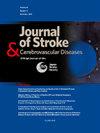Efficacy of high-frequency peripheral magnetic stimulation in treating patients with persistent hiccups post-stroke: A retrospective study
IF 2
4区 医学
Q3 NEUROSCIENCES
Journal of Stroke & Cerebrovascular Diseases
Pub Date : 2025-02-18
DOI:10.1016/j.jstrokecerebrovasdis.2025.108262
引用次数: 0
Abstract
Background
This study retrospectively evaluated the efficacy and safety of peripheral magnetic stimulation for treating persistent hiccups in patients after stroke.
Methods
In this retrospective study, we categorized patients with persistent hiccups post-stroke admitted to the Rehabilitation Medicine Department of Wuhan University People's Hospital between May 2022 to August 2023 into two groups. The experimental group received 10 Hz peripheral magnetic stimulation targeting the phrenic nerve, whereas the control group received a daily intramuscular injection of 10 mg metoclopramide. Treatment efficacy over a 3-day period, hiccup scores before and after treatment, and overall clinical efficacy were compared between the two groups.
Results
Seventeen patients diagnosed with persistent hiccups post-stroke were included, with nine in the control group and eight in the experimental group. There were no significant differences between the two groups in terms of the number of hiccups, hiccup scores, or age prior to treatment. After 3 days of treatment, the clinical efficacy was 55.56 % for the control group and 100 % for the experimental group (P = 0.01). Three patients in the control group experienced adverse reactions, whereas no adverse reactions were observed in the experimental group (P = 0.036).
Conclusions
High-frequency peripheral magnetic stimulation may be more effective and associated with fewer adverse effects than metoclopramide injections for patients with intractable post-stroke hiccups. Our findings suggest a novel therapeutic strategy for managing persistent hiccups following a stroke.
求助全文
约1分钟内获得全文
求助全文
来源期刊

Journal of Stroke & Cerebrovascular Diseases
Medicine-Surgery
CiteScore
5.00
自引率
4.00%
发文量
583
审稿时长
62 days
期刊介绍:
The Journal of Stroke & Cerebrovascular Diseases publishes original papers on basic and clinical science related to the fields of stroke and cerebrovascular diseases. The Journal also features review articles, controversies, methods and technical notes, selected case reports and other original articles of special nature. Its editorial mission is to focus on prevention and repair of cerebrovascular disease. Clinical papers emphasize medical and surgical aspects of stroke, clinical trials and design, epidemiology, stroke care delivery systems and outcomes, imaging sciences and rehabilitation of stroke. The Journal will be of special interest to specialists involved in caring for patients with cerebrovascular disease, including neurologists, neurosurgeons and cardiologists.
 求助内容:
求助内容: 应助结果提醒方式:
应助结果提醒方式:


